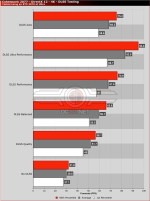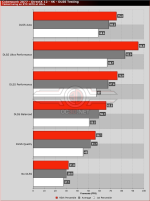My take based solely on my experience with cyberpunk and dlss @ 3440x1440 on my monitor and my oled tv:
- native still "looks" better than dlss set to quality @3440x1440
- dlss quality setting is very good though and much better than any other type of down/up scaling or/and mixes of different types of sharpening through redux/RIS etc.
- performance boost from using dlss @ quality is superb and worth the slight degradation in sharpness/clarity, give me a smoother experience over pin sharp quality
- with ray tracing AND dlss set to "quality", there is some very noticeable blurring in reflections on wet road surfaces (maybe only cyberpunk??)
- some trailing/ghosting with dlss, not sure if this is just with cyberpunk or other games where dlss is used though? However, to most people it probably isn't noticeable, I'm just very sensitive to motion clarity, which is why I prefer my oled screen over 144HZ LCD
Summary and what I prefer:
When playing games on my oled tv, I'll still take using a lower resolutions over dlss etc. as the IQ even at 1920x1080 is superior than native/dlss @ 3440x1440 LCD monitor
But if I was using my monitor and my FPS is <80 then I would defo use DLSS.
- native still "looks" better than dlss set to quality @3440x1440
- dlss quality setting is very good though and much better than any other type of down/up scaling or/and mixes of different types of sharpening through redux/RIS etc.
- performance boost from using dlss @ quality is superb and worth the slight degradation in sharpness/clarity, give me a smoother experience over pin sharp quality
- with ray tracing AND dlss set to "quality", there is some very noticeable blurring in reflections on wet road surfaces (maybe only cyberpunk??)
- some trailing/ghosting with dlss, not sure if this is just with cyberpunk or other games where dlss is used though? However, to most people it probably isn't noticeable, I'm just very sensitive to motion clarity, which is why I prefer my oled screen over 144HZ LCD
Summary and what I prefer:
When playing games on my oled tv, I'll still take using a lower resolutions over dlss etc. as the IQ even at 1920x1080 is superior than native/dlss @ 3440x1440 LCD monitor

But if I was using my monitor and my FPS is <80 then I would defo use DLSS.





 you are right ofc though it will run a little slowr ofc
you are right ofc though it will run a little slowr ofc